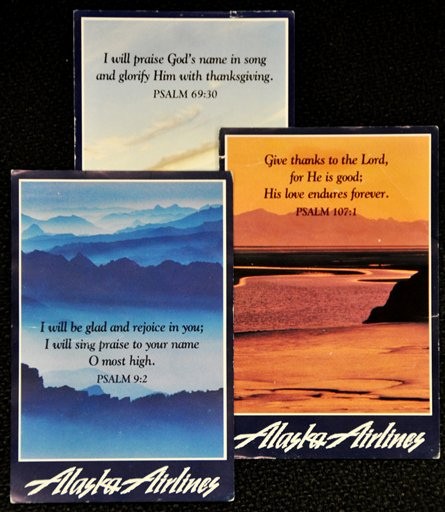Is it appropriate for an airline to hand out a prayer card with your meal? After doing so for decades, Alaska Airlines announced this week that it would be ending the practice effective 01 February 2012. Reactions have been mixed—some lament Alaska’s “surrender to secularism” while others express delight that Alaska had ended what they deem an assault on their values. Most don’t care—but I do, and am sad to see the prayer cards go.
I laugh a bit, because this was a very serious decision at Alaska. Last year Alaska summarily eliminated MVP Guest upgrades without so much as a personalized note to their most loyal flyers. But the decision to eliminate prayer cards was announced via e-mail to Alaska flyers in a note signed by the CEO and President.
Dear Mr. Klint,
At Alaska Airlines, we have provided prayer cards to our customers for more than 30 years. A former marketing executive borrowed the idea from another airline and introduced the cards to our passengers in the late 1970s to differentiate our service.
The cards have been provided only to our First Class customers since meal tray service ended in coach six years ago. Beginning February 1, 2012, however, we’ll be eliminating the cards entirely. This difficult decision was not made lightly. We believe it’s the right thing to do in order to respect the diverse religious beliefs and cultural attitudes of all our customers and employees.
Some of you enjoy the cards and associate them with our service. We also know some of you consider the cards to be a tradition that reflects your own spiritual beliefs. At the same time, we’ve heard from many of you who believe religion is inappropriate on an airplane, and some are offended when we hand out the cards. Religious beliefs are deeply personal and sharing them with others is an individual choice.
It’s important that everyone know that this decision does not change our core values nor our care for our customers. We’ll continue to distinguish ourselves through the pride and professionalism of our people on every flight and in our communities.
Our priority at Alaska is to fly our passengers to their destinations safely, on time and with their bags. We thank you for the opportunity to serve you and for the chance to demonstrate this commitment each time you fly with us.
Sincerely,
Bill Ayer Chairman and CEO, Alaska Air Group
Brad Tilden President, Alaska Airlines
Let me draw you to what I view as the key point in the letter—
Religious beliefs are deeply personal and sharing them with others is an individual choice.
 Without a doubt, religious beliefs are deeply personal and sharing them with others is an individual choice. But sharing is a choice the airline made in the 1970s and has continued for over 30 years. Now Alaska has made the choice it does not want to share with others. Why the change of heart?
Without a doubt, religious beliefs are deeply personal and sharing them with others is an individual choice. But sharing is a choice the airline made in the 1970s and has continued for over 30 years. Now Alaska has made the choice it does not want to share with others. Why the change of heart?
We all have heard the story of American Airlines removing olives from first class salads, saving the company ,000/year. This latest move may have been purely a move to defray costs, but I doubt it.
From working in the world of politics (and the aviation industry [which are often one and the same]) I understand that a few vocal whiners really can bring about changes in policy, but this is where I simply do not understand the intolerance of those who could not be bothered to turn over, crumple, or just ignore a small slip of paper that most passengers appreciated (afterall, the American people continue to overwhelming identify themselves as religious people, primarily Christian).
Some bemoaned the Christian slant of the card, but there were only three variations of the cards, each featuring an innocuous Old Testament Psalm that just as easily could have been found in the Islamic Zabur. No mention of Jesus or some of the more controversial scriptures (like John 3:16, which In-N-Out places on the bottom of their cups).
Does the fact that Alaska catered to their religious flyers suggest they had an animosity toward non-believers? Of course not—that would be as ridiculous as saying Alaska’s gay and lesbian travel page demonstrates animosity toward straight people. The prayer cards simply were a nice sentimental touch meant to remind religious people of the simple truths of their faith, like “give thanks to the Lord for He is good.”
True, Alaska’s choice of translation was not fully accurate (love in Psalm 103:7 is better translated mercy or lovingkindness), but can anyone really tell me with a straight face that these little prayer cards were offensive? Have people no tolerance for views that differ from their own anymore?
It angers me when I get on a United flight and see that overhead movies really are not edited much anymore. Nothing like a flight filled with foul language, violence, and sex for all the youngsters onboard, but I ultimately let it slide because 1.) no one is forcing me to watch the movie and 2.) I can appreciate the fact that most disagree with my viewpoint. I’m not about to jump ship on United because of something as trivial as their IFE choice nor should United cut out IFE that most people seem to enjoy just because I am slightly offended. Do you see the parallel?
America is not a Christian nation—nations cannot be Christian, only people can. America is also in a continued state of evolution, as changing demographics and social mores lead to an ever-tightening tension with religious dogma that has been unquestioned for centuries. But Americans remain a religious people and I don’t see a problem with Alaska recognizing that.
Thankfully, I don’t hear anyone foolish enough to claim Alaska’s distribution of prayer cards should be banned by law or violates the Constitution, but I just kindly ask my traveling brethren who may be indifferent or opposed to Alaska’s prayer cards to remember that no one is forcing you to read them. Please think twice before spouting the odd contention that the distribution of these cards constitutes on assault on your values. Reasonable minds can differ on the sagacity of the prayer cards in the first place (an in all likelihood, Alaska ushered them in under former-CEO Bruce Kennedy merely to pander), but please have a little respect before trying to denigrate the inspiration or solace these cards have provided to many, myself included.




wow, so opinionated and so off base. I did not fly Alaska and one of the reasons was those prayer cards. It’s indoctrination and preaching, that’s how I felt about it, and it offended me. My choice was to not fly them. I don’t want people attempting to tell me how to think, how to believe, how to pray or not, or whatever. I expect a US based airline to fly me from point A to point B.
Was I super offended by the prayer cards. No. But it did bother me.
So are you saying that I was wrong to feel the way I felt about those prayer cards? There’s no way you can say that, because then you would be telling me how I should feel and how I should think, and what’s the difference, Mathew?
Personally, I’m glad they announced what they announced.
I don’t begrudge anybody’s private beliefs. I do begrudge those that attempt to tell me how to think or how to feel or how to believe, in any form.
-David
-David
A well thought out discussion. I find it sad that we have turned into a society that can’t accept other viewpoints without becoming instantly offended at the littlest things. Political correctness has made us less tolerant.
When you say:
.
“Does the fact that Alaska catered to their religious flyers suggest they had an animosity toward non-believers? Of course not—that would be as ridiculous as saying Alaska’s gay and lesbian travel page demonstrates animosity toward straight people”
.
you are incorrect. A more apt description would be if every passenger were handed a copy of Out Magazine upon boarding. Of course, they could choose to crumple or discard it, as you say. But I doubt we’ll see it happen any time soon and, if we did, I doubt you’d consider it a desirable, or even permissible, intrusion into each passenger’s life.
@David:
But people tell us what to do or think all the time. Cable news, politicians, advertisements. Tis life…
No, I am not telling you were wrong to hold the convictions you do. You admit that you were not super offended by the prayer cards but they still bothered you because you do not want people preaching to you. That’s fair.
But a little tolerance goes a long way (not to say you are intolerant). I don’t think Alaska meant the prayer cards as an attack on anyone’s faith–but rather as an affirmation of many people’s faith. In our pluralistic society, I prefer that to a crusade attempting to extinguish anything and everything that may be controversial from the public square.
Again, how do you avoid life?
@Stephan: Thanks for your comments.
I agree.
I prefer prayer cards or Out Magazine over being subjected to loud in-flight credit card offer announcements.
@LarryInNYC
I understand the analogy you are trying to draw, but I don’t think drawing such a conclusion is valid.
First, the point I was trying to make is that supporting religious folks and non-religous folks is not mutually exclusive, just as supporting LGBT and straight travelers is not mutually exclusive.
To your point–a prayer card is different than a magazine, though even a magazine would not give me cause me to avoid the airline. Starbucks just came out swinging as the gay marriage debate moves to Washington State. What if Starbucks included a little “prayer card” on all trays making the case for same-sex marriage? My argumentation would be exactly the same.
@Grant: LOL. Me too!